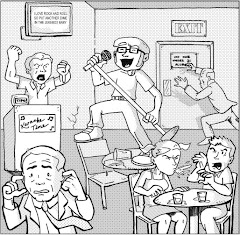writers: Cindy Goff & Rafael Nieves
artist: Seitu Hayden
letterer: Bill Oakley
colorist: Brad Vancata
editor: Marc McLaurin
While yesterday’s subject, Numb, was interestingly introspective, Bloodlines is provocatively global in its context; further, since the end of February is near, I figure I better get a move on with the comics I’ve intended to review during Black History Month. Bloodlines is beautifully packaged with an eye-catching Brian Stelfreeze front cover and an impressionist image of Africa on the back, but unfortunately, the issue’s contents aren’t as easy to digest.
This “tale from the heart of Africa” works on a few different levels, and depending on the reader, leaves a powerfully convicting impression. Bloodlines essentially recounts the recent political of the African country Ngaragba, a French “colony” with poorly established borders that inadvertently yet dangerously ignored centuries’ worth of tribal boundaries. Enemy was pitted against enemy and families were divided, a tension that resulted in a military coup under the leadership of Colonel Jean-Bedel Bokassa. First named president, then self-proclaimed emperor, Bokassa was so fueled by an admiration for European royalty and Napoleon Bonaparte that the expectations of his rule became impossible for his impoverished populace to fulfill. When students couldn’t afford the expense school uniforms Bokassa decreed they wear, he swept up 200 of them and brutally murdered them himself. While this massacre revealed the horror of his reign, it also encouraged his French supporters to aid in his deposition. Bloodlines is a comic book about this terrible episode in history, and although such a clannish account rings of an epic from the Middle Ages, it happened between 1966 and 1979 – if not in your lifetime, then your parents’. And I presume that, like me, you had no idea.
African history, which is presumably equivocal to black history for most, is an enigma to the average American. Heck, unless Brad Pitt is adopting another, we’re too consumed with the melodramatics of our own political arena, if a celebrity’s personal woes aren’t dominating the headlines first. This ignorance is the vantage point from which writers Goff and Nieves decide to tell this tale, as doctor-in-training Sylvestri Adamba, the fictional former physician to Bokassa, shares his account as first an aid to, then a prisoner of, the dictator. Adamba was witness to the slaughter of those 200 children, a nightmare he’s managed to suppress in favor of a happy life with an American Peace Corps volunteer. Unfortunately, his girlfriend’s pal Cathy can’t let the past go, and she prods him to recount the story to completion. Basically, sans emotional solemnity, this issue is an illustrated history lesson evoked by nagging American guilt, a dimension that would damage to reduce the context’s impact if it wasn’t steeped in reality. In the beginning of the story, we see Cathy make fun of her mother for watching a special on Ngaragba’s history, but the plot commences five years later, when Cathy is actually in the needy nation with the Peace Corps, she wonders why she feels such an impassioned connection to the country. While we readers are dumbfounded by her seemingly short memory, we’re equally disappointed when her realization of the memory is as anticlimactic as an afterthought. With so much to digest in a relatively brief amount of comic book space, these character dynamics were unnecessary. The history is compelling in itself.
Further, when Cathy discovers a comic book adaptation about the atrocities in her dorm (a Hamlet-esque move, I presume), she muses, “Who wants to read a comic book about superheroes?” The commentary is lost on me, as it comes too deep in the issue to make a significant satiric impact. I’m already invested, genuinely interested. Why question it, or even make light of it? By the early nineties, the modern “indie comix” movement was in full swing. Bloodlines is a unique title in its historical relevancy, but not its overall presentation.
Still, of all of the comic books I’ve read these past few weeks, and the few I have yet to review, Bloodlines: A Tale from the Heart of Africa, represents the true scope of Black History Month. While we Americans celebrate the lives of Martin Luther King and Rosa Parks, black and white folks alike should occasionally pull back the lens to get a global perspective, if only to understand the breadth of the human condition. Political atrocity isn’t a racial phenomenon . . . nor is history, when you think about it. We share this planet, its land. We should all know what it’s been through, what lines have been drawn in its sand, and how we can cross them to unite.




1 comment:
I'm very happy that our meager efforts had any impact whatsoever, particularly 15 years after its release!
Thank you for the kind words, and the healthy, well though out critique...
Rafael Nieves
Post a Comment